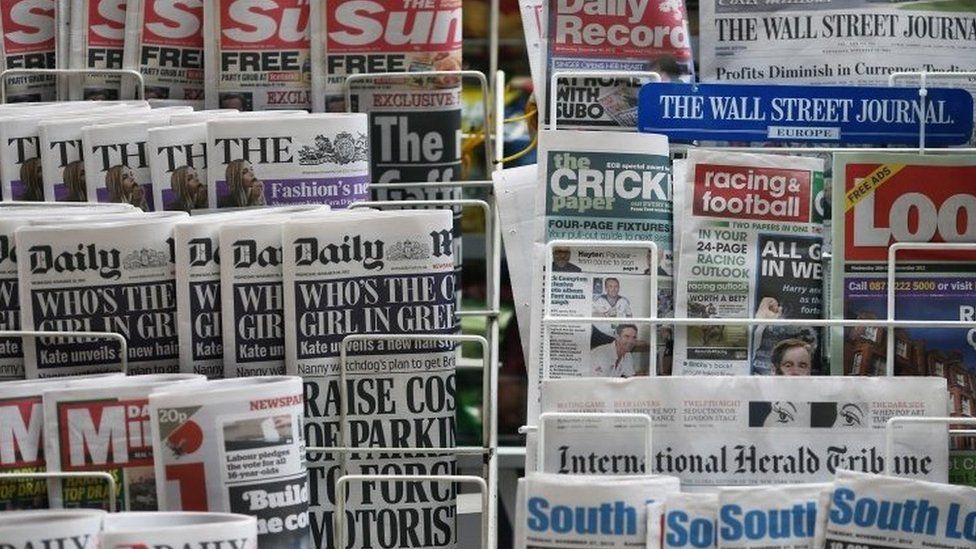First official UK press regulator, Impress, approved
- Published

The first officially recognised UK press regulator has got the go-ahead from an independent panel.
Impress, established by press reform campaigners, received formal approval from the Press Recognition Panel (PRP).
Campaign group Hacked Off has welcomed the decision, but bodies representing the press warned it will bring "state-sponsored" regulation of newspapers.
Most newspapers have signed up to rival Ipso - the press-funded regulator which did not seek official recognition.
Impress, which currently regulates 25 small specialist publications, has received funding from former Formula One boss Max Mosley, the Joseph Rowntree Reform Trust and author JK Rowling.
It was given the go-ahead by the PRP, which was set up in the wake of the Leveson Inquiry to ensure any future press regulator met certain standards.
Analysis: Divisions persist on press regulation
Evan Harris, joint executive director of Hacked Off, which campaigns for greater press regulation, said the decision paved the way for the "first regulator to have proven its independence and effectiveness" under the Leveson system of independent assessment.
"The days of failed industry-controlled regulators like the PCC and its sham replacement Ipso are numbered," he said.
"This decision makes Impress the only regulator which the public, readers and victims of press abuse can trust to regulate newspapers and safeguard freedom of the press, while offering redress when they get things wrong."
'State-sponsored system'
However, Impress's bid for official recognition has angered many newspapers, who argue it would be a threat to press freedom.
Lynne Anderson, deputy chief executive of News Media Association - which represents publishers - said she was disappointed by the decision to recognise Impress, saying it had been set up "to trigger punitive costs sanctions against Britain's press".
She also defended Ipso - which represents most of Britain's main national and regional newspapers - saying it was "effective and independent".
She added: "Not a single significant national or regional newspaper or magazine has signed up to the state-sponsored system of regulation under the PRP."
Bob Satchwell, from the Society of Editors, said the PRP had been "set up by politicians with public funds" and has "no real work to do because Impress represents only a very small number of local publishers".
An Ipso spokesperson said: "We have been regulating the overwhelming majority of the UK's newspapers, magazines and news websites for the last two years and will continue to do so."
The background to press regulation
Milly Dowler, 13, was murdered in 2002. Her phone was later hacked by a private detective working for the News of the World
In 2011, it emerged that thousands of people, from celebrities to families of murder victims, including Milly Dowler, had been victims of phone hacking by the now-defunct News of the World.
In response, then prime minister David Cameron set up a public, judge-led investigation - the Leveson Inquiry - to examine the culture, behaviour and ethics of the press.
Lord Leveson recommended newspapers should continue to be self-regulated - as they had been by the Press Complaints Commission - but that there should be a new press standards body created by the industry, backed by legislation, and with a new code of conduct.
Plans to set up a new press watchdog by Royal Charter were backed in 2013 by Mr Cameron and the UK's other main party leaders at the time, Ed Miliband and Nick Clegg, but the press rejected them and formed its own regulator, the Independent Press Standards Organisation (Ipso).
The Press Recognition Panel (PRP) was set up under the same Royal Charter to ensure that regulators of the UK's press were "independent, properly funded and able to protect the public".
Its main role is to consider applications from press regulators that want to be recognised as being effective.
Culture Secretary Karen Bradley will now have to decide whether to activate regulations which could see newspapers face "exemplary" damages if they are sued for libel unless they agree to be regulated by Impress.
Triggering Section 40 of the Crime and Courts Act 2013 would mean any newspaper that refused to sign up to the new regulator could have to pay the legal fees of a complainant who sued them for libel, even if the paper won the case.
However, appearing before the Commons Culture, Media and Sport Committee on Monday, Ms Bradley made clear she would be in no hurry to activate the regulations.
She told MPs there were fears among local newspapers in particular that they could be forced out of business if the rules were enforced and she wanted to consider all the options before making a decision.
Former Culture Secretary John Whittingdale told BBC Radio 4's Today programme he was opposed to the Section 40 proposals.
He said: "If you bring in these sanctions, you are going to punish every newspaper across the country.
"If you're saying to somebody that unless you join this you are going to be liable for potentially millions of pounds of costs, even if you win your case, that's not just an encouragement."
However, Mr Harris said those who signed up to Impress would receive protection from excessive legal costs through a "low-cost arbitration service" that would help settle legal disputes."
- Published13 April 2016
- Published8 September 2014
- Published3 July 2013
- Published18 March 2013